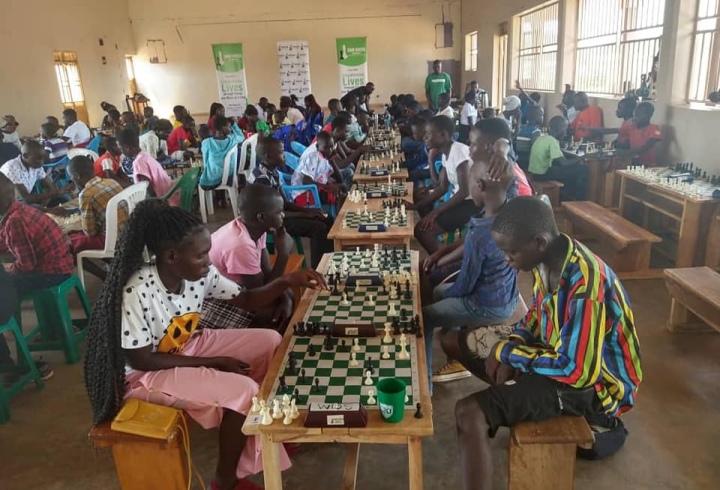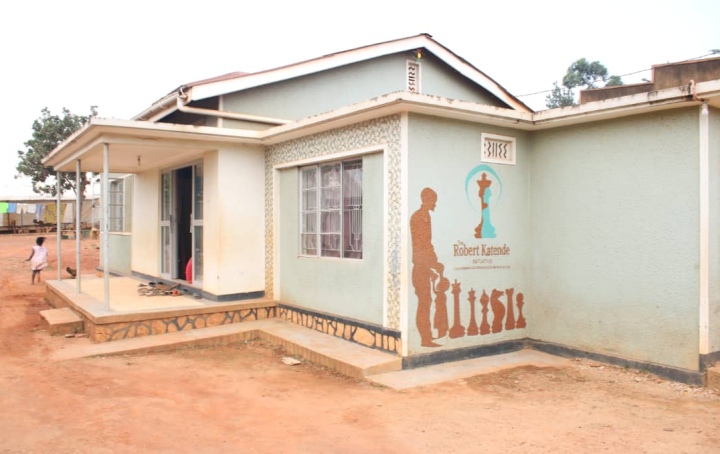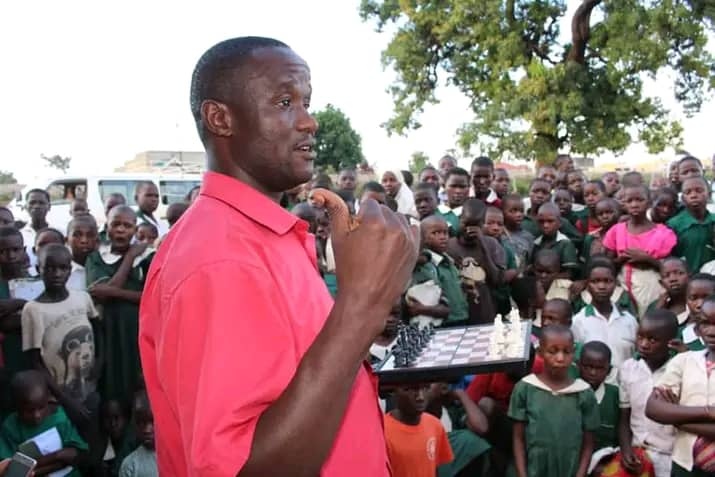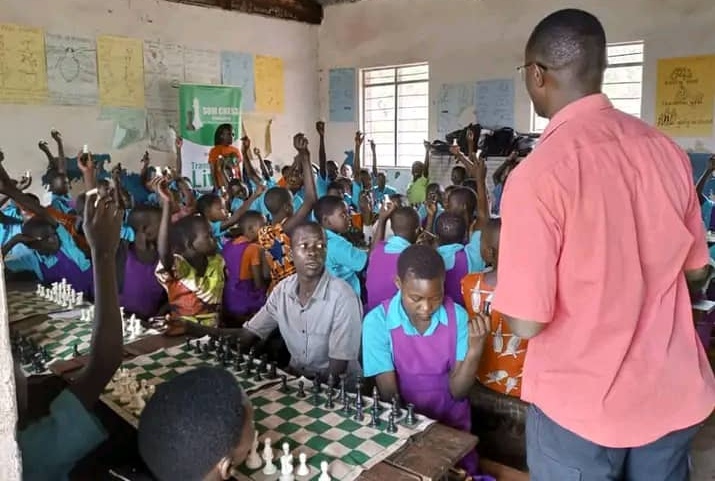SOM Chess Academy is not your standard chess school. Its founder, Robert Katende, managed to bring chess into the lives of the children of Uganda’s slums. Starting with a single chessboard and a desire to help, he managed to uplift the lives of thousands of disadvantaged children. Katende is probably best known for being the man who taught Phiona Mutesi, Uganda’s Women Candidate Master, whose story was turned into a Disney movie, “The Queen of Katwe”, released in 2016. Erick Takawira, Councillor of the FIDE Social Commission, interviewed Robert Katende to learn more about bringing chess to slums and using it to impact people’s lives for the better.
– Robert, where did your journey start? What inspired you? There must be something which kicked in you to say, I want to do this kind of work.
– The most intriguing factor is that I just wanted to figure out how I could contribute to the well-being of the children who were struggling in the slum life, having lived it myself. I was asking myself how it could be a solution for some of the learners who were craving and struggling to see how they could make it in life. I did not have a full idea that it would ever be as it has turned out to be anyway.

– Is this where SOM comes in, or were you doing it without any organization linked to it?
– I was using soccer to reach out to the children in the community through Sports Outreach but realized some of them were not interested, and the majority of the girls, soccer wasn’t their thing. My heart was like: how can I reach out to these kids? And I gave birth to the idea of chess. I knew how to play chess and had a chess set, so I decided to introduce them to the game and make it a platform where I engaged with them.
– Where are you located?
– We have a center where I am right now in Kampala. This is where we hold all our events, and it has been ten years since we acquired this space. We call this SOM Chess Academy Arena on Mityana Road. We are also developing another small center in Katwe where the program started from.

– Who can be part of SOM?
– Anyone can be part of our programs. Although our heart is reaching out to the less privileged individuals, we are open to everyone who embraces the vision. To be a member of SOM, every child is required to register and subscribe by paying Ugx 10,000 (about $3) a year. It gives access to the teaching program, the feeding program, Vocational skills study and education support opportunities.
– What are the lessons you could say you have learnt in this journey?
– When I started bringing chess into the less privileged communities, especially when we came to Katwe, people did not understand what chess was all about. It was very challenging allowing children to be part of it as most thought it was gambling. Space was a challenge, so we initially had to conduct the program from a former dumping site. The children themselves wouldn’t embrace it, but some would hang around because of the feeding program. Taking kids to a tournament positively struck people’s minds that it was bigger than they first thought.

– What challenges could you say you are facing? Where do you look for hope?
– The biggest challenge right now is funding because the needs are many to realize and sustain our vision. It is really encompassing in terms of financial and human resources. We look forward to partners willing to work with us. We are now facing a challenge, especially after COVID, because most of our partners fell off after that.
– Do you have any strategic partnerships? Are there any organizations supporting the work you do?
– We don’t have many organizations that have partnerships with us; most of them are more like one-time grant people. Sports Outreach is our key supporter and doubles as our mother organization, then the Robert Katende Initiative. The rest are one-time supporters such as Go Campaign, Issroff Foundation, Rosie J Coe foundation, Bilu Uganda, World Vision, SBC, FIDE and UCF.
Then we have single families and individuals, the Robert Katende Initiative, registered in the USA, which was founded in 2017 with the sole purpose of supporting the two learners, Benjamin Mukumbya and Phiona Mutesi, that had gotten into the US Colleges on a tuition scholarship. We need funding and thus call for partners to invest in this vision so that we can sustain what we are doing and also be able to scale the impact in other communities across Africa.
– Are there any other projects you have undertaken to educate the children and make their lives better?
– Chess is more of a teaching tool we use to identify the potential of the learners. We guide and direct them to their destiny. We have an education support program where over a span of 19 years, we have close to 40 graduates who have gotten through SOM programs. We have engineers, doctors, accountants etc. We have vocational skills and computer training programs. The Centre has a computer lab, and we plan to start coding in 2024.

– What would you say is the social impact of chess?
– Chess bridges the social gap created economically and levels the ground. It brings people from all spheres of life on the board to reason together and interact. Chess bridges the two ends together so that irrespective of gender, age, economic status, or educational background, people get a platform to engage and learn from each other.
– What is your hope for SOM? What do the programs need to grow?
– Our theme is to restore hope and transform lives. We need to have connectivity and good networking with supporters, that connectedness is going to break the vicious cycle of poverty and illiteracy. We are looking for partners so the program can be franchised in other countries. We want to always celebrate everyone who can adopt the vision and embrace it and stick to the concepts that we teach. We are aware that some of the learners who are part of our program may never get to be chess champions, but we are certain that they are life champions in their own potential.
– Without Robert Katende, the inspiring success story of ‘Queen of Katwe’ does not happen. What do you say to that?
– (Laugh) It has been a team effort, a journey of perseverance, endurance and sacrifice. Children have now taken on different impactful life trajectories. They are becoming responsible individuals even globally because, as I speak now, Phiona is working with Microsoft. It is a journey of life transformation to where they inspire others to endure no matter the circumstances that exist daily.
– Any advice for those aspiring to do similar social chess initiatives?
– Have a heart that loves people no matter who they are. You must be willing to go beyond yourself. Be willing to listen and not want to fix people. You must work to embrace their abilities, and you see how you position them into their strengths. That’s like when we get to the chess board, you can never move a bishop along ranks, people are all wired differently and gifted differently. You take full responsibility and ownership of your vision. You say, okay, I’m going to invest my time, my life into their lives so that they can be people of substance. Another point would be to have a curious mindset trying to find out why things are the way they are, especially when dealing with children.
– Which three people would you invite to SOM Centre?
– I would say the President of Uganda H.E Yoweri Museveni, and the President of the International Chess Federation Arkady Dvorkovich, he needs to witness what chess is doing for community transformation firsthand. I would also invite Michelle Obama because of the ladies and the girls she has been able to inspire.
Photos: Robert Katende Initiative

